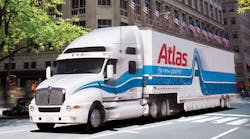Company: Atlas Van Lines, Evansville, IN
Operation: A leading carrier of household goods in the U.S. and Canada; all its trucking equipment is owned and operated by its agents
Problem:
Long a household name in moving services, Atlas Van Lines also handles corporate relocations and transports such high-value items as electronics and fine art. All its services are carried out via an extensive network of nearly 500 independent agents, which together solely own parent firm Atlas World Group.
Serving customers who expect nothing less than on-time and safe delivery of their possessions, the fleet operations of Atlas Van Lines’ agents aim to run over the road as efficiently and safely as possible.
Of course, the household goods mover also keeps a close eye on all highway-safety regulations it must comply with as well as those it will need to comply with in the near future.
That’s why Atlas set out to proactively prepare for the federal electronic logging device (ELD) regulation expected to be mandated later this year, according to Jeff Schimmel, vice president of transportation services.
Mandate or not, Schimmel expects that retiring paper logs will help increase hours-of-service (HOS) compliance. That should pay dividends by improving driver safety and morale and also maximizing available hours, which should benefit customer service.
Solution:
According to Schimmel, Atlas Van Lines determined that moving to electronic logging to track its drivers’ hours in near real-time would increase management efficiency by boosting the accuracy of reporting. He says doing so would also ensure they’ll be ready to comply with the Federal Motor Carrier Safety Administration regulations for electronic logging devices.
“We are aware that new government mandates are expected late this year, so we went ahead and decided to switch for better compliance,” Schimmel explains. “In addition, we wanted to become more efficient, have fewer mistakes and hopefully be ahead of the curve before the new law’s requirements are put into place.
“Some of the other benefits we expected an electronic logging solution would provide us include fewer DOT issues and continuous improvement on our overall CSA scores,” Schimmel notes.
Having already deployed Omnitracs’ Mobile Computing Platform 50 (MCP50) along with a suite of applications selected to help hit safety and regulatory-compliance goals, Atlas opted to add Omnitracs’ hours-of-service solution to the mix.
“Omnitracs MCP50 was the right mobile solution to fit Atlas Van Lines’ unique needs based on our varied services across the country,” Schimmel states.
“It’s extremely important that our drivers deliver cargo safely and efficiently within the scope of the new ELD mandates,” he continues. “And the MCP50— coupled with the HOS application—will help us achieve these goals while managing our compliance efforts much more easily.”
Schimmel points out that a key selling point of the Omnitracs HOS application is that it enables drivers to switch between multiple operating authorities. He said that feature was “among the critical factors” that contributed to Atlas selecting Omnitracs over other ELD providers.
“We are in the process of converting to the HOS application,” he says. Given the large number of agent fleet operations involved, he estimates that “in the next year or so” Atlas will complete the full switchover.
Already, though, Schimmel points out that “a majority of our drivers are seeing benefits to electronic logging—once they are fully accustomed to the new system. We’re looking forward to helping them out with the transition and receiving feedback along the way.”



